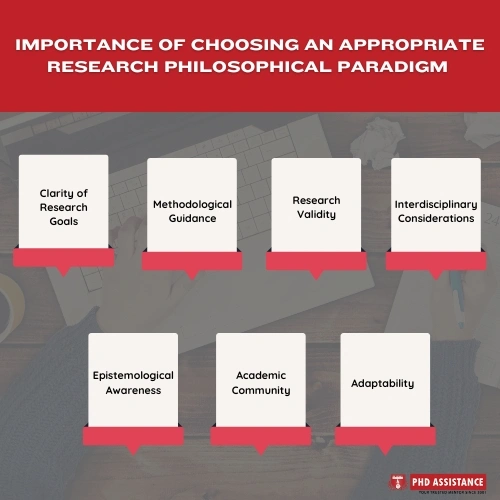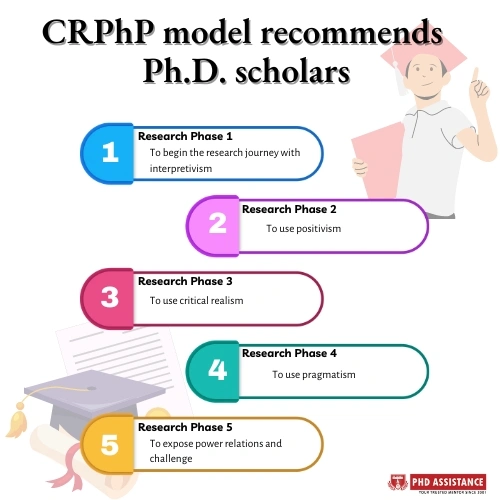A Review of the Paper “Why is it Called Doctor of Philosophy & Why Choosing Appropriate Research Philosophical Paradigm is Indispensable During Ph.D. Program?”
Introduction
Research methodology is a continuous search for reality across various philosophical paradigms and perspectives. Ph.D. scholars must remember that they will be awarded a Ph.D. degree for doctoral-level research, which involves identifying gaps and formulating research questions. The success of a PhD degree depends on the quality of research outputs, such as research articles and a thesis. The journey begins with identifying research gaps and formulating a research question. The second step is choosing an appropriate research philosophical paradigm to find a scientific and scholarly answer to the research question. PhD scholars must thoroughly understand various research philosophical paradigms before starting any steps in their PhD journey.
Doctoral-level research is crucial for the PhD program, aiming to create researchers who can create new knowledge or interpret existing knowledge using different perspectives and philosophical paradigms. This requires autonomy, quality time, stress-free thinking, and the freedom to seek meaningful findings. The flexible nature of doctoral-level research allows scholars to formulate questions and answer them within 3-6 years using an appropriate research philosophical paradigm. However, only 50% of PhD scholars completed the program within ten years, indicating a lack of awareness of the importance of a doctor of philosophy in psychology in the Ph.D. degree.
Research Philosophical Paradigms:
Philosophy of research has three important components such as,
- Ontology (What is the nature of reality?).
- Epistemology (What is the nature of knowledge?)
- Axiology (What is the nature of value?)

As for the importance of choosing an appropriate research philosophical paradigm during a PhD program, here are some key reasons:
- Clarity of Research Goals: Selecting a philosophical paradigm helps clarify your research goals and approach. It provides a foundational framework for your study, guiding your research questions, qualitative research methodology, and data analysis.
- Methodological Guidance: Different paradigms come with distinct research methodologies and methods. For example, positivism emphasizes empirical observation and quantitative analysis, while constructivism leans towards qualitative research and interpretation. Choosing the right paradigm aligns your research philosophical assumptions and methods with your research questions.
- Research Validity: An appropriate philosophical paradigm enhances the validity and rigour of your research. It helps you justify your choice of methods and data collection techniques by aligning them with your chosen paradigm’s underlying assumptions and beliefs.
- Interdisciplinary Considerations: In some cases, interdisciplinary research may require blending multiple philosophical paradigms to address complex questions. Understanding the philosophical underpinnings of different disciplines can help you bridge gaps and engage in meaningful interdisciplinary work.
- Epistemological Awareness: By delving into philosophical paradigms, you develop a deeper awareness of how knowledge is constructed, validated, and communicated in your field. This awareness can lead to more critical and reflective scholarship.
- Academic Community: Engaging with philosophical paradigms enables you to communicate more effectively with peers and mentors within your academic community. It allows you to situate your research within the broader context of your field.
- Adaptability: While choosing a philosophical paradigm that aligns with your research is important, being open to different paradigms can also be beneficial. It allows you to adapt your approach as your research evolves or as you encounter new challenges.
The CRPhP Model for choosing Philosophical Paradigm:
The research philosophical paradigm is a “basic belief system or worldview that guides the investigation”. That is why choosing an appropriate research philosophical paradigm is indispensable during the doctoral-level research process. An appropriate philosophical research paradigm must be chosen based on one or more of the following options in the order of priority.
- Best suitable philosophical research paradigm example to answer the research question.
- End-use of research output.
- End-users of research output.
- Demand (gap) for different philosophical research paradigms.
- The philosophical research paradigm example thesis that is commonly used in your area of research.
- D. scholars’ philosophy.
Check out our sample research methodology example to see how PhD Gap identification is obtained.

The CRPhP model recommends that PhD scholars follow the path in the sequence listed below.
-
- Research Phase 1: To begin the research journey with interpretivism (after an in-depth literature review about the existing knowledge concerning reality) and introduce the scholar’s theoretical/conceptual model.
- Research Phase 2: To use positivism for testing the scholar’s theoretical/conceptual model.
- Research Phase 3: To use critical realism for rationalizing scholars’ tested model.
- Research Phase 4: To use pragmatism to finetune the scholar’s model and make it practical (make it work).
- Research Phase 5: Once the scholars have used these four research philosophical paradigms to understand the reality/phenomenon of their research question then in phase 5, they are required to expose power relations and challenge dominant views about the reality/phenomenon.
Check out our study guide to learn more about How to Select an Effective Title for Your Manuscript.
Conclusion
In summary, the choice of an appropriate research philosophical paradigm is indispensable during a PhD in psychology program because it provides a foundational framework for your research, guides your methodology in a research paper, enhances the validity of your work, and fosters a deeper understanding of the nature of knowledge and inquiry within your field. It’s a crucial aspect of conducting meaningful and rigorous research at the doctoral level.
About PhD Assistance
PhD assistance offers professional services for the research methodology chapter for any type of researcher struggling or stuck on analyzing certain aspects such as research design, sample work, samplesize,powercalculation,qualitative and quantitativemethodologyand primary and secondary data collection. We deliver better content that positively affects your grades. We meant ‘positive’, and that is possible at Ph.D. Assistance.
References
-
- HR, Ganesha, and P. S. Aithal. “Why is it Called Doctor of Philosophy and Why Choosing Appropriate Research Philosophical Paradigm is Indispensable During Ph. D. Program in India?.” International Journal of Philosophy and Languages (IJPL)1 (2022): 42-58. http://dx.doi.org/10.2139/ssrn.4263406
-
- Muhaise, Hussein, et al. “The Research Philosophy Dilemma for Postgraduate Student Researchers.” International Journal of Research and Scientific Innovation4 (2020): 2321-2705.



